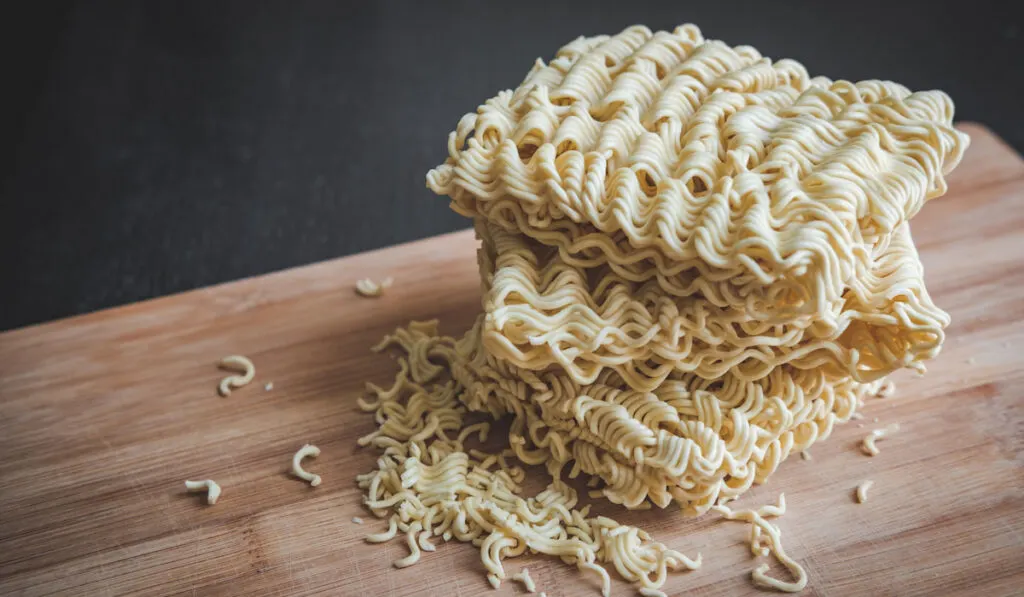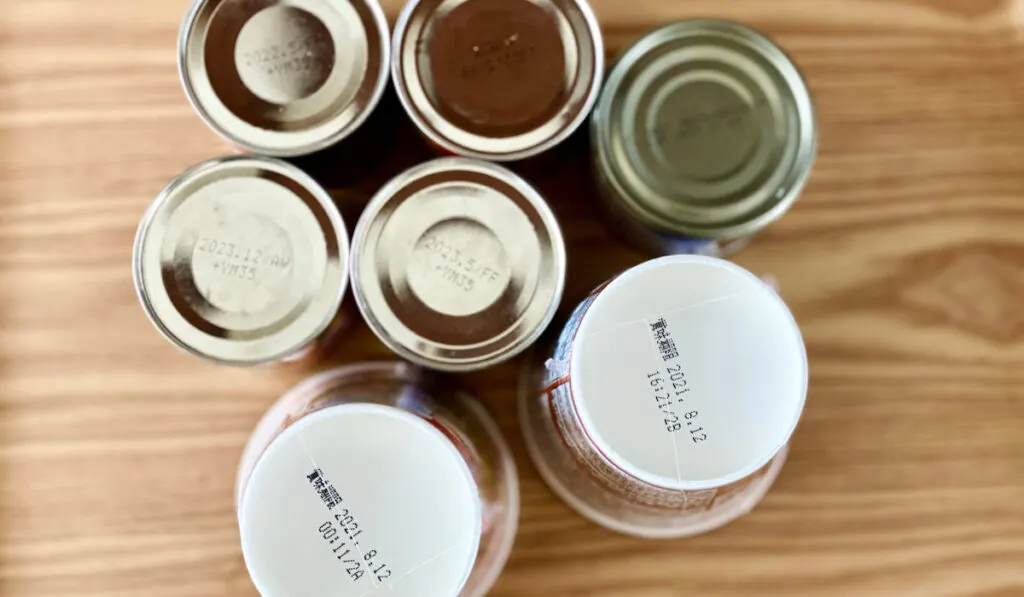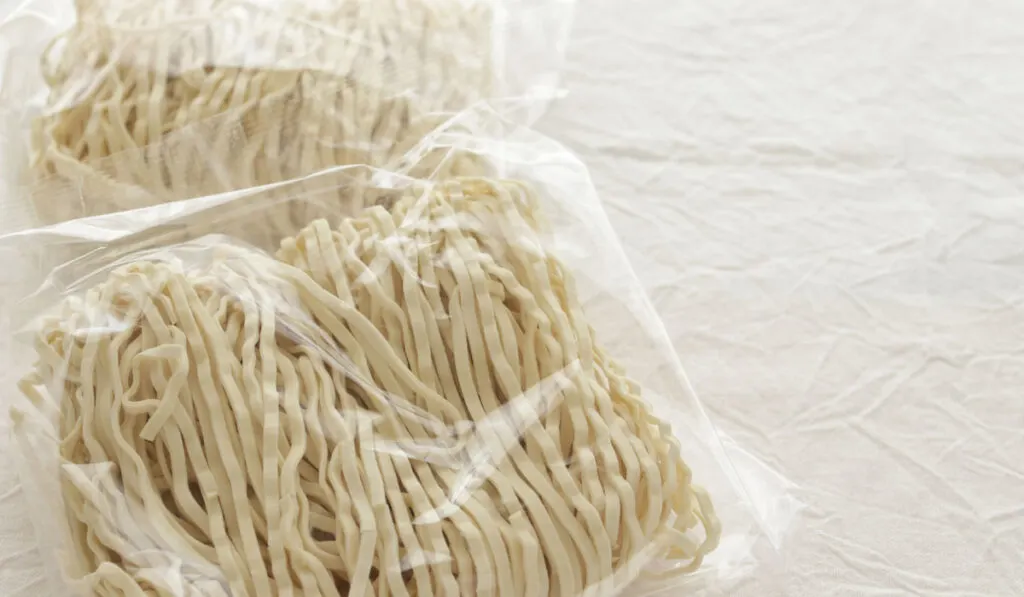Ramen is one of the best food storage options out there. It has an incredibly long shelf life, and you can use the noodles in a host of different recipes.
Ramen is a great, affordable option for people who want to bulk up their food supply without breaking the bank.
But does ramen go bad or expire?
Ramen, like almost every other food item, has an expiration date. However, there is rarely any visible deterioration in instant noodles for months after they technically expire.

Still, it’s best if you only eat ramen noodles within their “best by” date on the packaging.
Of course, people should avoid eating ramen that’s moldy, smells rotten, or is otherwise spoiled.
Keep the packages sealed to prevent moisture from getting inside and ruining your noodles before they’re ready – opening the package significantly reduces the shelf life.
Here are some helpful tips on keeping your ramen fresh and what to know about its expiration dates.
Table of Contents
Ramen Shelf Life
Ramen noodles are a fantastic choice for people who want years of food storage. It’s also a terrific option for emergency supplies because ramen is easy to make and mix with other ingredients.
But how long is ramen’s shelf life, and when does it start to go bad?
Normally, ramen expiration dates are around two years from the manufacture date. That’s a long time, and ramen can taste good even after expiration.

People use ramen for food storage because a case of ramen is very affordable, especially compared to proteins, nuts, fruit preserves, and other foods.
Ramen is also usually cheaper to buy than other dry pasta, so you can use ramen noodles even when you want to make spaghetti Bolognese.
How Do You Know if Instant Ramen Is Bad?
It’s a good question because people often open ramen packets after the expiration date, and there is no sign that it’s gone bad.
There are ways to tell if instant noodles are bad.
Of course, you never want to eat spoiled food, so here are some things to look for when opening a pack of ramen.
Moisture
Water exposure is the thing that affects your noodles the most. If your dry ramen gets wet, it’s “curtains.”
There is almost no way you can keep your ramen noodles for a later date once water gets to them.
Air Exposure

Remember, there’s moisture in the air too, so any long-term open-air exposure can spoil ramen noodles.
For example, opening a pack and leaving it on the counter for days could make the noodles go soft and start to mold.
Mold
No one should ever eat moldy or rotten food.
It’s possible for ramen to mold even though it’s hard. Ramen can mold when it gets wet or is left out in the open air for too long.
If you see any visible signs of mold, throw the ramen away in the trash rather than try to eat it.

What to Do With Cooked Ramen
Most extra ramen after a meal goes in the trash because it’s notoriously hard to store once it’s cooked. The noodles soak up too much water or stock and become soft and soggy.
After you cook ramen noodles, can you store them in the fridge?
Ramen will last longer in the fridge than it would out on the counter, but it only lasts a few days at best.
If you want to keep your ramen in the refrigerator, empty any excess liquid from the bowl. Put the leftover noodles in a sealed container and stick them in the fridge.
You can try to use it for lunch or dinner the next day, but you’re pushing your luck with anything beyond that.
Can You Freeze Cooked Ramen?

Yes! You can freeze cooked ramen to make it last much longer than it would in the refrigerator.
After cooking your ramen, put it in a sealed container and shove it in the freezer.
Frozen ramen can last as long as a month.
However, this should only happen if you cook an outstanding meal with instant noodles.
Freezer space is often precious and reserved for meat, ice cream, and other expensive dairy products. Having a ton of ramen in your freezer doesn’t make much sense because it’s cheaper just to make a new batch of noodles.
Still, if you like to cook things in large batches, you can break up your noodles and freeze them to avoid spoilage.

Eating Ramen After the Expiration Date
Eating a pack of ramen after it expires in almost every instance will be fine. You are very unlikely to get sick or experience any differences in flavor.
Of course, this may not be true in extreme cases where people try to eat a pack of ramen that expired a decade ago or something like that. Typically, a pack of instant noodles will still be fine weeks or even months after its expiration date.
Before you add water to your ramen or toss the noodles in a pot of boiling water, check it to make sure there are no obvious signs of mold or spoiling. If it looks and smells good, you should be fine to eat it!

Tips for Storing Ramen Long-Term
The price and shelf life of ramen noodles make them an attractive option for people building food storage inventory. They’ve been a mainstay of people who like affordable food that tastes good and is easy to make.
If you want to keep your ramen in good condition for as long as possible, keep the packets sealed and away from other foods that could get them wet or tear the plastic wrap.
You can keep packets of ramen in a plastic tub to keep air out as an added layer of protection for peace of mind.
Final Thoughts
Your instant noodles should last for years, and you can always cook your noodles when they near expiration or pick up another case to replenish your food storage.
